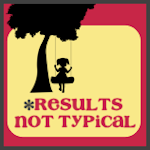Tomorrow, I'm heading to Oklahoma City. I have a lot to do today in preparation - not only for the trip itself, but for leaving my family again for several days.
Easter Seals is hosting a pumpkin patch event, so after I go grocery shopping and before I go in to work to restock my supply of promotional items, we'll go to that. BTW, Playette HATES her costume, which I find hilarious. I know, I'm wrong.
There's not much time to spare and I'm having one of those days where maybe it's best that I don't go on a typing tirade, so here's some good info that I found on the Families Exploring Down Syndrome (FEDS, gotta love that) web site. (It's a parent support group in Michigan)
This actually relates to something I will be sharing with you all in a little while...I hope this is helpful to someone in the meantime.
Tips for Family and Friends
[relative to a new Ds dx]
Grandmas and Grandpas, Aunts and Uncles, and Friends:
You may not be aware that what you say and do, at this critical time, could be totally wrong. Here are a few "Dos" and "Don'ts" that parents of children with Down syndrome suggest that we share.
Some of the "Don'ts":
The well-meaning statements on this list can and do anger new parents, and even those who have been parenting for a while.
* Saying "I'm sorry" or relating any other form of pity.
Pity is not what new parents want or need. What they need is love and acceptance of their new baby. [Generally, anything that alludes to the idea that the parents just gave birth to anything other than a newborn human being? Not good. Yeah, I went through that. -- cts]
* "God gives special parents special children" or any variation.
The new parents probably don't feel very special right now. Some parents may be a little angry with God. Trying to make them feel better with words like these might be appreciated by some parents but not by others. It is best to avoid saying this.
* "They're such loving children."
This is a stereotype of children with Down syndrome and demonstrates that you really don't know much about Down syndrome.
* "There is a special place in heaven for people like you."
The new parent wasn't anticipating a special place in heaven with this birthing experience; the new parent wanted a "normal, healthy newborn". The special-place-in-heaven statement might evoke a response good for neither you nor for the new parent.
* "Do they know how serious it is?" or any variation.
Again, this is a demonstration of a lack of knowledge about Down syndrome. Some parents may be angry and want to reply with, "How serious is it? Well, every single cell in his body has an extra chromosome... is that serious enough?"
* "You are handling this better than I could."
This is an invitation for the new parents to say something like, "No, you would be wonderful." Suddenly, the conversation has focused on you instead of on the parents and their new baby. Plus, you really DON'T know how the new parents are handling it. Do you?
* "He doesn't LOOK like he has Down Syndrome."
Down syndrome is not just a look, it is a chromosomal abnormality. The baby looks like a baby, but the extra chromosomes are still there. [This also infers that the parent did not take any necessary steps for confirmation. Trust me, I hear this a lot - we are sure and have it documented. -- cts]
* "Maybe the doctor is wrong."
This demonstrates a lack of knowledge about Down syndrome and genetics.
* "Maybe he just has a little Down syndrome."
Yes, just like being "a little pregnant."
* "At your age, didn't they think this could happen?". "Why didn't the doctor know?" "Didn't you have the test?"
None of these questions need to be discussed. Just because this child was born with Down syndrome does not mean the baby is inferior or a mistake. This is their new baby who was born with an extra chromosome. The baby was born with Down syndrome not because of anything anyone did. Making these statements and asking these questions is hurtful, a hurting best prevented by learning about Down syndrome from up-to-date publications.
Do say:
These are feel-good statements and actions which are usually well accepted and which all new parents would welcome.
* "Congratulations."
They just had a baby! What better response to show that you love them and their baby than to extend congratulations. "It made us feel like 'normal' parents when someone said that to us." If the hospital allows it, a bottle of champagne could be greatly appreciated. [I loved the cookies and flowers we received. It made me feel better. -- cts]
* "He/She looks just like you."
The baby probably does look like someone in the family. All of the baby's genes are from the family. "My son looked exactly like my daughter did when she was just born."
* Friends and family who actually 'do' something such as read about the disability (or find information on the web!)
This thoughtfulness really means something to the new parents. It shows love and concern for the baby. "The day after we told Megan's Aunt about Megan having Down syndrome, she came to visit us with a book and with articles dealing with Down syndrome which she had found on the web. That showed us that she really cared."
* Offer to baby-sit.
It is a fear of the new parents that their family will not accept the new baby. By saying something like, "Well, when are you going to let me baby-sit?", you are showing the new parents that you want to be a part of the baby's life. This will be a great relief to them.
* "We will always be here to help."
Another very good way to show that you intend to be a part of their lives. [Meals are a great idea. We were so consumed that I'm pretty sure that there was no chewing going on in our house for that first week. -- cts]
* "He/She will do fine."
The new parents are probably pretty worried. They might not know much about Down syndrome, and they may be concerned about possible medical problems. Your having a positive attitude will rub off on them. They don't need pessimism or negativity from their loved ones. Even professionals who are not up-to-date on Down syndrome issues can give off a hurtful negative attitude. You need to be the positive and informed person who will offer support and acceptance.
* "We'll all learn from him/her."
This is another good way to show that you intend to be a positive part of their lives. After all, how can you learn from their new baby, if you are ashamed of him/her? Their new child will give everyone involved an opportunity to learn about love, acceptance, and respect for persons with disabilities.











6 comments:
Wow, girliebomb, you travel a lot! :)
can't wait to see pics of that baby in her costume...eben if she is crying, lol
LOL...hey we were told that they would pray the Down syndrome out of her! I seriously thought that was crazy funny actually!
Thanks for sharing this Chrystal. I've been compiling a mental list of the best and worst things said to us since Finn's birth, and a lot of it is here on this list. I might have to steal this to post on my blog . . .
Aw, Ant hates his costume too!!
The most amazing comment I have had so far is "Do you think she got Down syndrome from the two races mixing." Seriously, can you believe that!!?
Great post.
Post a Comment